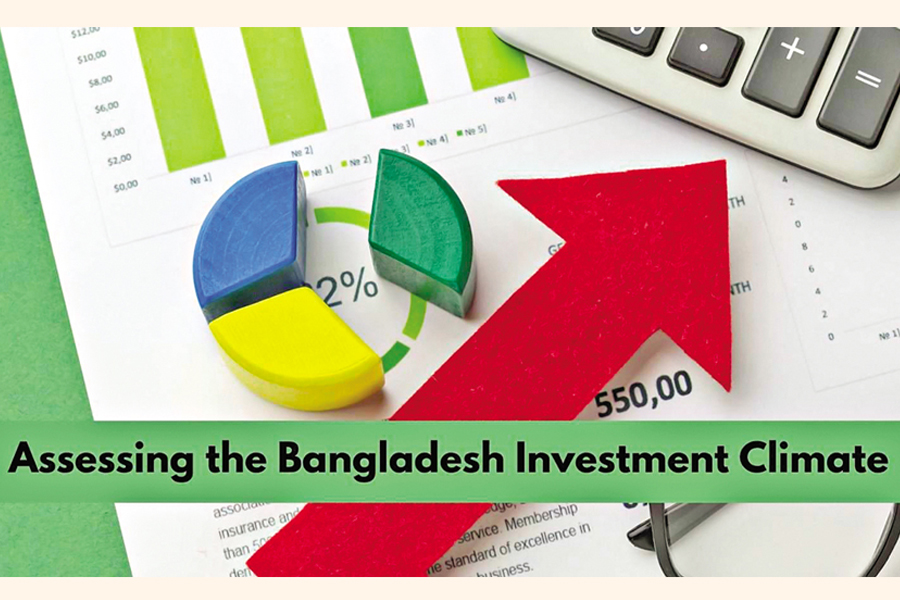
Published :
Updated :

Creating a congenial environment to attract foreign direct investment (FDI) is no longer just a developmental goal, it is a necessity. In an increasingly competitive global market, where nations are vying for foreign capital, it is imperative that Bangladesh presents itself as a promising destination that fosters investor confidence and ensures ease of doing business. While some progress has been made in recent years, particularly in terms of infrastructural upgrades and policy-level commitments, significant gaps still exist that need urgent attention. Without these corrections, foreign investors are likely to remain hesitant, and the country may miss out on vital investment opportunities.
The urgency of this issue came to the fore during a recent meeting of the joint Bangladesh-China Working Group (WG) on economic cooperation and investment. The meeting highlighted the pressing need for Bangladesh to offer a more investor-friendly climate, particularly as Chinese businesses show a growing interest in establishing operations in the country. The dialogue saw participation from representatives of the Chinese Ministry of Commerce, the Chinese Embassy in Dhaka, and Bangladesh's Economic Relations Division (ERD), among others. Notably, this meeting served as a preparatory session ahead of the upcoming Bangladesh-China Joint Economic Commission (JEC) meeting scheduled to be held in Dhaka on June 1.
China has long been a major economic partner of Bangladesh, both in terms of trade and investment. In the fiscal year 2023-24, Bangladesh imported goods worth US$16.637 billion from China, accounting for 26.4 per cent of its total imports. This clearly underscores the high demand for Chinese products in the domestic market. Additionally, China, including Hong Kong, has emerged as one of the leading sources of FDI for Bangladesh. According to data from the Bangladesh Bank, Chinese FDI reached $2.789 billion as of December 2024, making China the second-largest investor in the country.
Chinese enterprises are actively involved in an array of diverse sectors, including textiles, energy, manufacturing, and infrastructure. Major development projects such as the Padma Bridge and the Karnaphuli Tunnel in Chattogram bear testimony to China's significant involvement with Bangladesh's growth journey. Moreover, as production costs rise in China and geopolitical uncertainties prompt companies to explore alternative markets, Bangladesh stands to benefit from the "China Plus One" strategy, which encourages diversification of manufacturing bases beyond China.
Recognising this opportunity, the interim government has expressed a strong desire to attract more Chinese investment, particularly in high-priority sectors such as healthcare, renewable energy (solar panel manufacturing), and high-value-added textiles. However, to fully leverage the advantages of China's industrial relocation, Bangladesh must address persistent challenges that have long plagued its investment ecosystem.
A leader of the Bangladesh-China Chamber of Commerce and Industry (BCCCI) recently pointed out that while Bangladesh is proactive in seeking foreign investment, especially from China, various structural impediments continue to discourage investors from making long-term commitments. Despite Bangladesh's favourable factors -- such as a strategic geographical location, competitive labour costs, and the development of economic zones-the investment climate is often marred by bureaucratic inefficiencies, infrastructural shortcomings, policy inconsistencies, and a lack of transparency.
Chinese businesses, along with other foreign investors, frequently cite several critical obstacles. These include prolonged and complex approval procedures, inefficient customs processes, and inconsistencies in the application of rules and regulations. The overall business environment suffers from sluggish government agency responses and a general sense of unpredictability, making it difficult for investors to navigate the system with confidence.
Infrastructure remains another major area of concern. Despite some improvements, Bangladesh continues to grapple with an infrastructure deficit. Unstable electricity and gas supplies, congested ports, and underdeveloped transport networks all contribute to increased operational costs and delay in project implementation. These inefficiencies diminish the country's competitiveness in the global investment landscape.
A glaring example is the slow pace of progress in implementing the proposed economic zone dedicated to Chinese investors in Anwara, Chattogram. Despite high expectations and early enthusiasm, the project has seen delays, which has only added to investor frustration. This not only weakens investor sentiment but also affects the credibility of Bangladesh's investment commitments.
According to analysts, the only way forward is carrying on with deep-rooted reforms. Administrative inefficiency and corruption must be addressed head-on. Streamlined approval processes, transparent and consistent policy frameworks, and the digitisation of public services could significantly improve investor confidence. Moreover, consistent dialogue between the government and the private sector -- both domestic and foreign -- will be essential to identify and resolve bottlenecks on a continual basis.
Additionally, leveraging successful regional models could be helpful. Learning from investment-friendly practices in countries such as Vietnam, Indonesia, Cambodia can offer valuable insights for Bangladesh. These countries have successfully improved their rankings in global indices such as the Ease of Doing Business and the Global Competitiveness Report, largely due to systemic reforms and robust infrastructure development.
Bangladesh at the moment stands at a critical juncture. With global supply chains shifting and investors looking beyond traditional destinations, the country has a golden opportunity to position itself as a viable alternative. However, this will only be possible if it takes meaningful and sustained steps to address the underlying issues that inhibit FDI. A conducive, transparent, and efficient business environment is not just desirable -- it is imperative if Bangladesh is to emerge as a key investment destination in the region.
wasiahmed.bd@gmail.com


 For all latest news, follow The Financial Express Google News channel.
For all latest news, follow The Financial Express Google News channel.